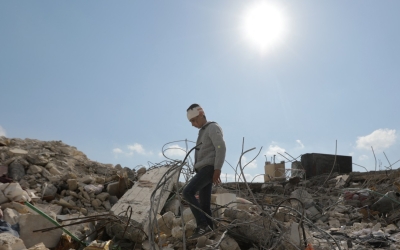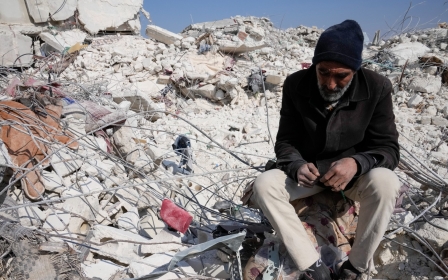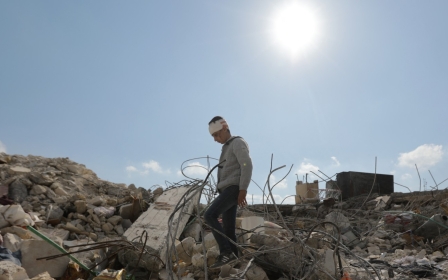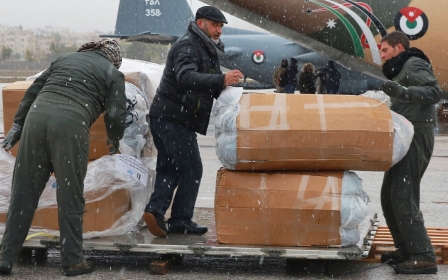Turkey-Syria earthquake: More delays in aid to Syria means more lives lost
As I write this, the death toll from last week's devastating earthquake stands at more than 33,000. By the time you read this, the number will be significantly higher.
At this very moment, rescue workers are digging through the rubble that has trapped thousands of people still missing in both Turkey and northwestern Syria.
The international community has the responsibility to act beyond words of solidarity and short-term pledges
The scale of the damage caused by the earthquake is impossible for anyone to imagine and has yet to be fully uncovered. Rescue missions are now turning into recovery operations.
In Turkey, authorities have estimated that 180,000 people may still be buried in the rubble.
New MEE newsletter: Jerusalem Dispatch
Sign up to get the latest insights and analysis on Israel-Palestine, alongside Turkey Unpacked and other MEE newsletters
'Half-measure' policies
The apocalyptic levels of destruction we are seeing in northern Syria in particular are a result of half-measure policies the international community has taken when it comes to Syria. To this day, little international aid has come into northwest Syria.
The newly-opened Bab al-Hawa crossing along the Turkish-Syrian border is the only aid corridor, and it is under the threat of closure in a similar fate to the other routes held hostage by Russia’s veto. On Monday, a week after the disaster, President Bashar al-Assad under UN pressure agreed to open two more border crossings to let more aid into quake-hit opposition areas.
In the meantime, people in northern Syria have been left to pick up the pieces alone - those who have found themselves braving war and displacement are having to dig up their friends and families from the rubble with their bare hands.
In the days that followed the earthquake, the only things coming through the border were the hundreds of body bags being returned to their families.
No emergency equipment, no aid, no rescue teams, just dead bodies. Only now we are beginning to see aid trickling into the region, but nowhere near enough to deal with the catastrophe at hand.
Even before the earthquake, there was a humanitarian disaster with an estimated 4.1 million people relying on humanitarian assistance.
The area’s health facilities have been hanging on by a thread for the past decade - made worse by the regime's deliberate targeting of hospitals and restrictions on aid access.
Failure to respond
The international community has the responsibility to act beyond words of solidarity and short-term pledges. Europe’s response has been particularly disappointing; while many countries sent rescue teams, it was after delays and days after the earthquake.
In a context where the first 48 hours are crucial to saving lives, this was simply not good enough. Even the UN has admitted its failure towards the people of northwestern Syrian, citing the delayed arrival of urgent aid to earthquake victims.
Preventing such delays, as noted by the White Helmets, could have saved lives.
The UK government’s response has not been much different. The Disaster Emergency Committee raised over £60m in three days from the public, this included a mere £5m ($6.08m) from the government.
So, while the people of the UK have stepped up generously in giving, the UK government has failed to replicate this - with minimal immediate funding and vague promises of more to follow in the weeks and months ahead.
This partly reflects the disengagement by the international community towards the region at a time when the war in Ukraine is holding diplomatic and donor attention. The UK's laudable support for Ukraine must not be at the expense of the rest of the world, particularly those areas affected by crises.
In 2021, then-Chancellor Rishi Sunak cut the aid budget from the UN target of 0.7 percent of GNP to 0.5 percent. This amounted to a cut of 21 percent, from £14.5bn ($17.6bn) to about £11.4bn ($13.8bn).
In the case of Syria, aid was reduced from £181m ($220m) in 2020 to almost half that at £91m ($110m) in 2021. At the time, many leading charities warned that these cuts would have a devastating effect.
To be absolutely clear: these cuts have cost lives.
European and western governments must do better. We cannot be bystanders in this horrifying tragedy. The road ahead is long and it is only in the days and weeks ahead that we will know the true extent of the damage. It might be too late for rescue efforts, but we absolutely have a duty towards survivors.
More delays simply means more lives will be lost. There is an urgent need to ensure governments across the world are deploying every mechanism they have for humanitarian response.
Now is not the time for politicians to stand idly by - it is time to increase international aid for Syrian and Turkish earthquake victims and commit to leaving no one behind.
The views expressed in this article belong to the author and do not necessarily reflect the editorial policy of Middle East Eye.
Middle East Eye delivers independent and unrivalled coverage and analysis of the Middle East, North Africa and beyond. To learn more about republishing this content and the associated fees, please fill out this form. More about MEE can be found here.






